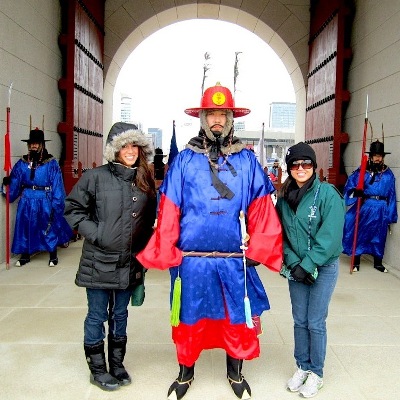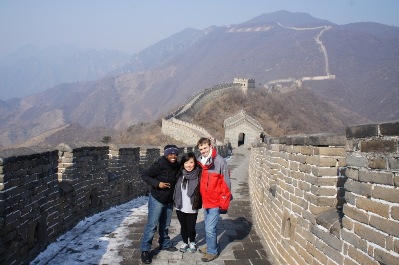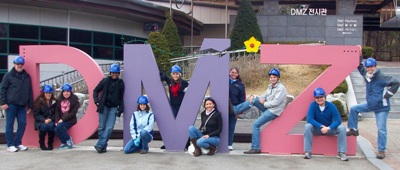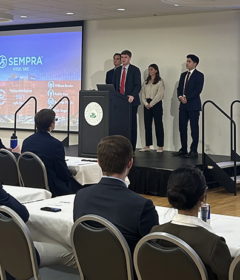MBA students explore Asia

Two military landmarks dominate Stetson University business students’ descriptions of their journey halfway around the planet to absorb insights into Asian economies, as well as historical and cultural perspectives.
Graduate students visited one Communist country, China, and from South Korea, peered into North Korea, another Communist country.
While in China in early March, they climbed the Great Wall, as have several Business School groups in years past. But the group led by Dr. Gary Oliphant also became the first to stand on the edge of South Korea and gaze across the Demilitarized Zone into the hazy blue hills of North Korea four kilometers away.
Those two world-famous military barriers, the ancient wall and the modern DMZ, made deep impressions. Early walls were built more than 2,000 years ago, but most of the wall today was reconstructed in the 14th century. The DMZ was established in 1953 as a fortified barrier between North and South Korea.
“I was a little nervous about going to the DMZ, but it was great,” said Laura Mayor, a manufacturing engineer who lives in Altamonte Springs, Fla. “Now I think to myself, ‘Wow, I was there.’” The Great Wall topped the DMZ experience, she said. “It was awesome. I wish it was closer so I could go back and walk farther.”
“It was interesting to experience firsthand the Demilitarized Zone, a place that you hear about on the news almost every day,” said Winter Garden, Fla., resident Seth Brewer, who works with Disney Creative Entertainment. “And it was truly inspirational to visit the Great Wall. You can look at thousands of pictures, but it’s never going to be as neat as it is when you climb it.
Oliphant said the experience of seeing the wall is unlike any other.

“This was my third trip escorting MBA students to China,” said Oliphant, chairman of the Decision and Information Sciences Department. “Every trip is different because of the dynamics of the group, but one thing is quite consistent – when students first experience the Great Wall.
“They get tears in their eyes. The thrill that comes from being where history was made, and to realize they are experiencing first-hand what they said in their history books when they were kids is very emotional. There is something special about standing where history was made.”
It was certainly emotional for Geoffrey Bride, who works in his family’s business in Ormond Beach: “I was overcome by a sense of awe and contentment that will stay with me for the rest of my life.”
The nine-day trip followed a semester-long course, Business and Culture in China and South Korea. It was taught by Dr. Becky Oliphant, a Marketing professor, International MBA director and wife of Gary Oliphant, who led the Asian trek when Becky could not. She designed the course to give students a working knowledge of marketing strategies in China and South Korea and an appreciation for the countries’ history, especially Seoul and Beijing.
Students gained insight into business in those countries every day, but made several business focused visits, including CCTV, China’s predominant state television broadcaster, the American Chamber of Commerce offices in Beijing and Seoul’s Lotte World, the city’s most popular theme park and the world’s largest indoor amusement park.

Talking with American Chamber officials was one of the highlights for Sarah Roudis of Kissimmee, Fla., because she learned how it helps Americans meet challenges of doing business in China, the world’s fastest-growing economy.
“The world is becoming a smaller place,” said Roudis, a benefits manager for Aon-Hewitt, a global provider of human resource services. “In business, we must be aware of other cultures. Not only how they are similar to our own, but to recognize and respect the differences. I truly feel that global interaction will be the only way to perform business in the future.”
By Ronald Williamson, writer for the Lynn Letter


